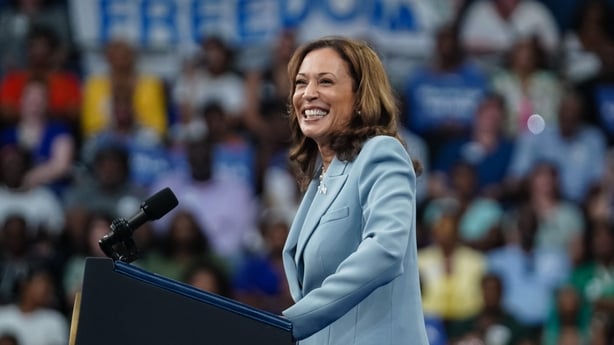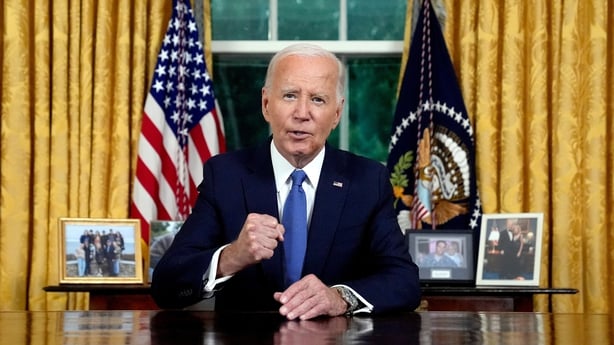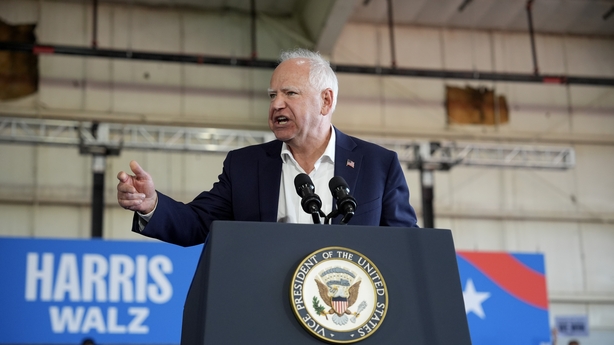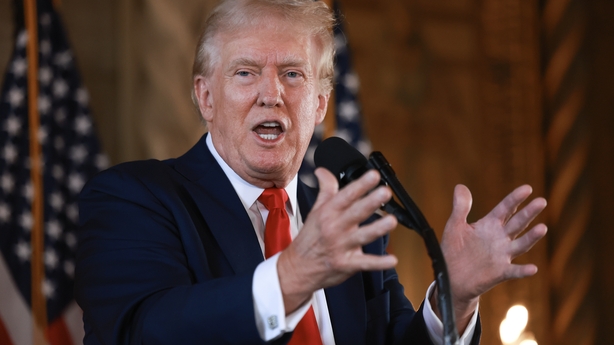Donald Trump has one great advantage in this election: The economy.
More specifically, the cost of living.
Not only was he fortunate to dodge an assassin's bullet last month - he was also fortunate to have been out of office over the last three-and-a-half years, so he could dodge the blame for inflation.
It’s one of the immutable rules of politics: Whoever is in power during a burst of inflation is to blame for it. Even if they are not, in actual fact, to blame for it.
The realities of the timing effects of fiscal and monetary policy amount to the square root of damn all at election time. Like pass the parcel, whoever is in possession at the wrong time loses. It’s one of the great incentives in democratic life for politicians to do everything they can to contain inflation. Because failure to do so is lethal for political careers.
So, Kamala Harris is vulnerable. After three-and-a-half years in power - or as much power as the Vice President ever really has - she has to share the blame for the inflation that has made the cost of everyday things here expensive. Them's the rules. If you are in the White House (or even the Naval Observatory) the buck stops with you - especially if it doesn't go as far as it used to.

And it doesn’t. According to the US Bureau of Labour Statistics, the stuff you could buy for $100 the day Trump left the White House now costs $120.11. Was that Biden’s fault? Yes, some of the inflation was stoked by a massive infrastructure spending programme called (with no official irony) The Inflation Reduction Act.
Some of it also was Trump's fault in the way he responded to the Covid pandemic - spending money, as did most Western governments, in support of the economy and employment. Economists knew there would be inflation later, but few objected at the time.
It was a similar pattern in the EU - government borrowing to keep the economy afloat, then big spending programmes mostly aimed at a green energy transition, to pump things up again.
Supply chain disruption and the war in Ukraine also helped stoke inflation. And the European Central Bank in particular had been following an utterly unorthodox policy of cutting interest rates below zero - effectively issuing free money - in an effort to restart growth in the EU economy, which had died after the financial crisis of 2008-2012. The Fed kept US rates super-low for the same reason
But none of that matters in electoral politics. The game is really simple: You were in power when the inflation hit my spending - you are to blame, 100% - you must lose office. It's a reality all politicians in power have to deal with, and a weapon all politicians in opposition are obliged to use.
So, Trump should just put this ball in the back of the net, right?
Harris has been part of the administration that has seen inflation surge. And in an attempt to stop that surge, the central bank - the Federal Reserve - has done what central banks do; it jacked up the interest rates, 11 times in 2022, taking it from virtually zero when Trump left office to 5.5% today.
That in turn has stuffed up the mortgage rates, which hit a high of 7% a couple of months ago. And like many places in Europe - notably Ireland - housing costs in the US have gone crazy, with both purchase prices and rentals skyrocketing. The situation is made worse by a huge drop in housing output, partly driven by interest rates and their impact on house purchases.
Looked at like that, the mystery is not why Trump is doing so well in the polls, but why he isn't doing much, much better? Sure, he has been sniping at the regime, and touting opinion polls in which the public say they felt richer under Trump than under Biden, because inflation and interest rates were low. But he could have done more.
It's a great place for him to campaign from, and Harris - being a lawyer with an electoral career of holding legal, not public finance offices - is not comfortable talking about economic issues.

Trump benefits from the myth of the businessman-as-political-saviour that many people buy into, especially in the US.
But Trump is ending this week with a self-inflicted wound from the economic front. In his hastily scrambled press conference on Thursday, he said he believed that the President should have a formal role in setting interest rates.
"I feel that the President should have at least a say in there, yeah, I feel that strongly", he said. He went on to claim that he was in a better position to make decisions about what the interest rate than Fed officials because of his business experience.
"I made a lot of money", he said, adding "I was very successful, and I think I have a better instinct than, in many cases, people that would be on the Federal Reserve or the chairman".
From the floor of the New York Stock Exchange, presenters on the rolling business news channel CNBC were taken aback, one pointing out that as a property developer Trump's single biggest cost item was the interest rate on the money he borrows for his schemes - so he pays a single minded attention to that, not the wider considerations the Fed, for example, takes into account in rate setting.
This, the presenters thought, was why Trump appears to believe that cutting interest rates will reduce inflation: In fact, rates are increased to choke off inflation, and are cut when it is falling. Pumping money into a hot economy does not cut inflation - it causes it.
The Fed, like the ECB has a 2% inflation target. Fed Chair Jerome Powell said in July that you don't wait until its 2% to cut, you start earlier – as the ECB did. But the Fed didn't cut in July, and all now believe it will cut in September (it's why mortgage rates are starting to fall here).
But Trump has started saying that to do so would be to give a political advantage to the Democrats - setting the Fed up for a charge of political interference.
Such talk is precisely why the Fed and other major central banks are given legal independence from the government of the day - they need to be able to use the interest rate mechanism to deal with inflation without looking at the political calendar. But Trump has needlessly caused himself damage among people who should be sympathetic. Such as the Wall Street Journal, which boasts the US's biggest print run of any newspaper.

The Journal has also weighed in against Tim Walz, Kamal Harris’s newly minted running mate. The paper's editorial board has been critical of his record as Minnesota Governor, accusing him of raising taxes to fund social spending and transfer programmes - leaving his state with the third highest income tax rate and second highest corporate tax rate, and noting that over the past two years, Minnesota’s private sector jobs growth has been 0.1%, compared to Republican run Florida's 2% private jobs growth.
Among the spending programmes Walz has introduced, paid family and medical leave (funded by a 0.88% payroll tax) and a redistribution package worth around $8,000 a year for low-income families with two children – partly funded by a 50 cent (that’s half a dollar!) charge on home delivery services from retailers. In the age of Deliveroo and Amazon, watch the spread of similar revenue ideas.
One of the strangest attacks on Walz by the Republicans has been on his decision to offer universal free school breakfasts and lunches. The former teacher was easily persuaded of the benefits of making sure all schoolkids had the nutrition to make it through the day and learn things - something that is good for the long-term health of the economy (more skilled workers), and which is often regarded as an investment, not a cost burden.
Eight other states offered free meals to all school kids over the last academic year - California, Maine, Colorado, New Mexico, Vermont, Massachusetts, Michigan and Nevada - the latter two being battleground states in November’s election. Free school meals were introduced as a temporary response to the Covid pandemic, funded by the Federal government, and proved to be popular with the public.

A You Gov poll published a year ago in a teacher’s magazine said 60% favoured free lunches and 57% free breakfasts. By party affiliation, 68% of Democrats, 62% of Independents and 47% of Republicans were in favour of free meals. Schools liked the plan too, because it cut down on the administrative burden of trying to separate out the low-income kids from the rest, whose families were deemed rich enough to pay. The social stigma this brought about was also disliked by teachers and parents.
More recent survey work has found the free school meals programmes are helping all families with the cost-of-living surge, easing the burden on households with children where it counts - in the grocery store, that weekly reminder of the high cost of living.
With such significant support levels for a relatively low cost programme - one that actually does seem to ease inflationary pressures in significant numbers of households - it seems odd to attack Walz over it, apart from trying to paint him as an extreme tax and spend California liberal in the snowy north (Bernie Sanders in hunting clothes as one former Republican Governor of Minnesota described him on TV during the week).
Which is perhaps understandable in the immediate aftermath of his unveiling as the VP candidate, as there is a race on to define candidates in the public mind before campaigning begins in earnest in September.
But maybe Trump should listen a bit more to Republican pollster Frank Lunz, who thinks the key group to watch in this election are those Americans living paycheque to paycheque, with no cash reserve to deal with problems when things go wrong, such as a broken car, an illness, flooding or fire damage.
According to Lunz, these people are about a quarter of the American population. That is a big chunk of the demographics - bigger than the black, Latino or youth segments.
Policies that seem popular with big sections of the electorate, which appear to have a rapid impact on household finances, might be more electorally appealing than a property developer fixated by bank interest rates seeking to get control of the Central Bank.






